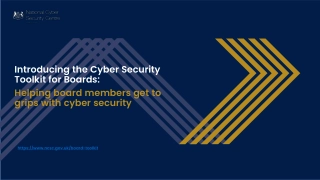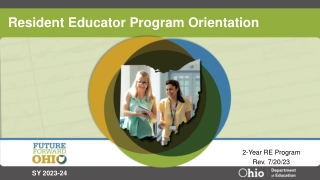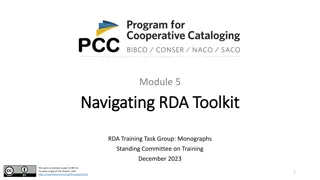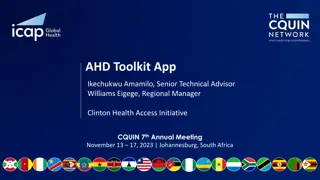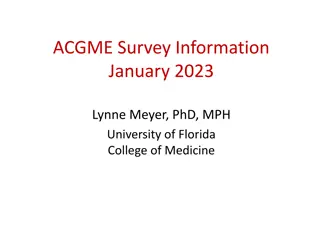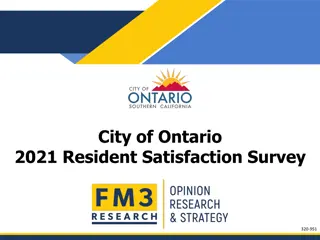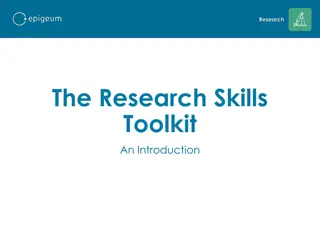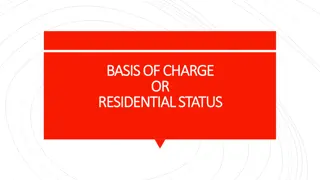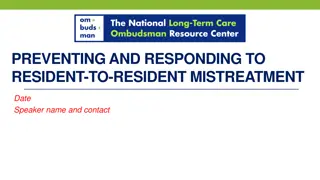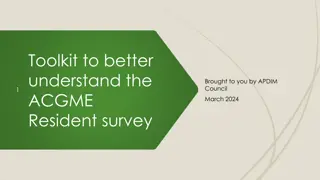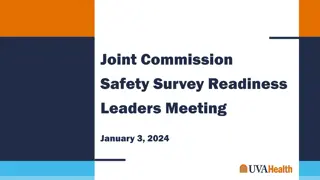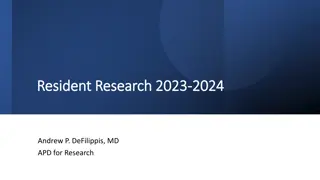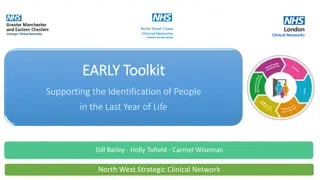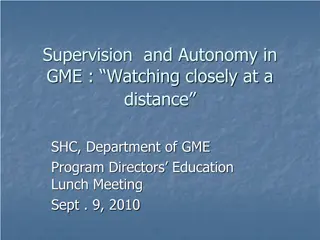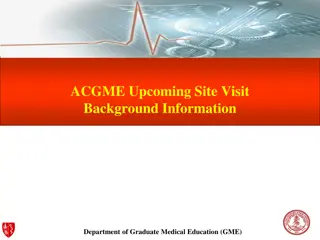Toolkit to better understand the ACGME Resident survey
The ACGME Resident Survey is an annual tool designed to capture residents' clinical, educational, and learning environment experiences. It aids in program accreditation and improvement by providing confidential aggregate data. Residents are encouraged to answer honestly as it does not impact program accreditation status. The survey reflects experiences over the academic year and follows specific scheduling logistics. Understanding survey frequency norms is crucial for accurate responses.
Download Presentation

Please find below an Image/Link to download the presentation.
The content on the website is provided AS IS for your information and personal use only. It may not be sold, licensed, or shared on other websites without obtaining consent from the author. Download presentation by click this link. If you encounter any issues during the download, it is possible that the publisher has removed the file from their server.
E N D
Presentation Transcript
Toolkit to better understand the ACGME Resident survey 1 Brought to you by APDIM Council January 2024
Purpose of the survey 2 The survey is conducted annually and contains questions about your clinical and educational experiences as well as your learning environment The data gathered in the survey is confidential and only aggregate program level data is provided by the ACGME to administrators and program directors The ACGME uses data from the resident survey as one of several tools to help determine program accreditation and to identify any potential problem areas where a program can improve the education of its residents
Answer the questions honestly 3 99% of IM programs receive Continued Accreditation Answering the survey honestly does not jeopardize program s accreditation status
Survey is for your current academic year experience 4 Unless otherwise stated, the ACGME survey is asking you about your experience over the course of the current academic year (from July 1 to June 30) This includes your experience in the inpatient, outpatient, and virtual settings, so please consider the entire year in your replies
Logistics of the survey 5 Your program will let you know when the survey is scheduled this year the ACGME is scheduling all programs for an 8-week window from February 12, 2024 April 7, 2024 You will receive an email from the ACGME with instructions for taking the survey. This email may get routed to your junk mail folder so please check your junk mail if you can t find the email The ACGME encourages you to ask your program for clarification regarding questions or terminology used in the survey that you do not understand
Survey Frequency norms 6 Always/A lot = very frequently Often/Quite a bit = frequently, not seldom Moderately/Sometimes = on some occasions, at times A little/Slightly = infrequently Never/Not at all = at no time, not ever ACGME may consider sometimes and moderately as potentially noncompliant The 5-point scale may flip between positive and negative responses being at the top or the bottom during the survey
Some terms are confusing... 7 In-House Call: In-house call refers to duty hours in addition to the regular resident workday that are spent within an institution so that residents are immediately available, as needed, for clinical duties. In-house call does NOT include night float, being on call from home, or regularly scheduled overnight duties. In-house call refers to resident shifts that approach or exceed 24 hours The Q3 limit applies to overnight in-house call, not to shorter shifts. The Q3 limit does not apply to a series of night shifts without daytime assignments (which would be a night float rotation) Night float: Is a rotation designed to eliminate in-house call or assist other residents during the night
Some terms are confusing... 8 Cross-coverage is the term to describe coverage of patients that a team member would provide for another resident on their patient care team. Example: John and Mary are interns on the same team. Mary would provide cross-coverage of John s patients on Saturday when John has the day off, and John would provide cross-coverage of Mary s patients on Sunday when Mary has the day off Assignment is synonymous with a clinical rotation (not a writing or reflective assignment) Instruction means any method in which the information was taught to residents/fellows e.g. online modules, written materials, workshops, didactics, direct patient care
ACGME Work Hours 9 Clinical and educational work periods must not exceed 24 hours of continuous scheduled clinical assignments, with an additional 4 hours which may be used for activities related to patient safety (e.g., transitions of care) and/or resident education. Additional new patient care responsibilities must not occur during these 4 hours. In rare circumstances, a resident may stay to care for a severely ill patient, attend to the humanistic needs of a patient or family, or attend a unique educational event Cannot work >28h continuous
ACGME work hours continued 10 The 80 hours limit and 1 day off in 7 are averaged over 4 weeks. It is allowable to work 90 hours one week, as long as you work 70 hours in another. It is allowable to have 0 days off one week, and 2 days off the next Must have at least 4 days free over a 28d period. (These are not necessarily consecutive days free) Are you able to adequately manage patient care within 80h? Are you pressured to work >80h? Residents must have at least 14 hours free of clinical work and education after 24+ hours of in-house call Work hours include in-house clinical and educational activities, clinical work done from home, and all moonlighting
ACGME work hours continued 11 Included in 80-hour work week Not included Inpatient and outpatient clinical care Reading done in preparation for the following day s cases Administrative activities related to patient care, such as completing medical records, ordering and reviewing lab tests, signing orders and handoffs Studying Research done from home Non-clinical work while on-call from home For call from home: time specific to clinical work done from home and time spent in the hospital after being called in to provide patient care Using an electronic health record and taking calls at home Membership time on a hospital committee Residents /fellows participation in interviewing residency/fellowship candidates Time devoted to military commitments if that time is spent providing patient care
Work hours: NY State exception 12 In NY state, the Bell Commission requires 1 day off in a week with no averaging Example of acceptable schedule: SUN MON TUES WEDS THURS FRI SAT Week 1 OFF ON ON ON ON ON ON Week 2 ON ON ON ON ON ON OFF
Education vs. Non-Physician obligations 13 Education includes providing care for patients in the clinical setting, in addition to didactic and small group teaching sessions Non-physician obligations: are those duties which in most institutions are performed by nursing and allied health professionals, transport services or clerical staff. It is understood that while residents, like non- resident physicians, may be expected to do any of these things on occasion, these should not be performed routinely by residents and must be kept to a minimum to optimize resident education. Examples: transport of patients from the wards or units for procedures routine blood drawing for lab tests routine monitoring of patients when off the ward clerical duties such as scheduling tests and appointments
Structured learning activities 14 Examples of structured learning activities: didactics, case conferences, M&M, grand rounds, workshops, online modules, simulation exercises, self-guided learning Do you have protected time to participate in these activities?
Cost Awareness Teaching 15 This may include High Value Cost-Conscious Care Opportunities to discuss cost awareness with faculty in patient care decisions? Education may include any method, e.g. : Online modules, written materials, workshops, didactics In the course of day-to-day patient care including virtual visits Community-based experiences Interprofessional patient-care discussions (e.g. Pharmacy, Social Work, Case Management) Include program specific examples (conferences, case- based discussions, QI curriculum/projects, direct patient care)
Educational Content on Healthcare Disparities, Palliative Care, and Assessing Patient Goals 16 Education may include any method, e.g.: Online modules, written materials, workshops, didactics In the course of day-to-day patient care including virtual visits Community-based experiences Consult experiences (inpatient or outpatient) Include program-specific examples:
Educational Content on Addiction Medicine/Substance Use Disorder 17 Education may include any method, e.g.: Online modules, written materials, workshops, didactics In the course of day-to-day patient care including virtual visits Community-based clinic experiences Inpatient consult experiences Include program-specific examples:
Feedback after assignments 18 ACGME defines assignments as rotations Feedback can be written and formal (as in a written evaluation) and/or verbal and just-in-time The ACGME may ask you about both While you may have other assignments such as scholarly work, journal club, etc. that are specific to your program, this is not the purpose of this question
Participation in scholarly activity 19 Residents must participate in scholarly activity by the end of their residency. Definition of scholarship participation is very broad and should include a variety. Scholarly activities include: Publications e.g., manuscripts, case reports, editorials, abstracts Conference presentations (posters and presentations at international, national, regional meetings) Quality improvement projects Chapters or textbooks Participation in funded or non-funded basic science or clinical outcomes research project Lecture or presentation (such as grand rounds or case presentations of at least 30 minutes duration) within the sponsoring institution or program Residents do not need to participate in ALL these activities.
Professionalism 20 What mechanisms do you have to confidentially report unprofessional behavior? To deal with problems/concerns? Include program-specific mechanisms Have you experienced or witnessed abuse? Abuse defined as public humiliation, physical harm, threat of harm, sexual or other forms of harassment, coercion, denial of opportunities or lower grades/evals or offensive remarks due to gender, race/ethnicity, sexual orientation Abuse against student, resident/fellow, faculty, and/or staff
Patient Safety and Teamwork 21 Do you know how to report patient safety events? Include program-specific screenshot(s) on how to report patient safety events Have you participated in adverse event or root cause analysis? This can include actual events or simulation, in-person or virtual, individual or group Include program-specific examples Do you feel satisfied with safety and health conditions?
Transitioning care when fatigued 22 The question asks whether the program has mechanisms in place that allow residents to transition care when they are fatigued This can include a jeopardy or back-up system to take over call, a coverage system among in-house residents to allow the fatigued resident to go off duty, a coverage system where the fellow or attending takes over call, a way to stop new admits or duties and transition to another care team member
Data about practice habits 23 Residents receive information about their practice habits on routine basis, both in the hospital and in the clinic setting Examples in the hospital setting may include inpatient core measures relevant to the specialty as a whole, QI projects outcomes, hand hygiene data, or any data from the hospital about your habits as a group or team Examples on the ambulatory setting include your patient panel data on chronic disease metrics (e.g., HTN, T2DM) and preventive health measures (e.g., vaccinations, age-related cancer screening) that you practice in continuity clinic
Working in an interprofessional team 24 Interprofessional teams include any members of the following: fellows, nurses, case managers, pharmacists, social workers, and other allied health personnel Teams do not have to be embedded into your rounding time, and can be external to rounding time in the inpatient setting In clinic or ambulatory settings, this includes all work with nurses, medical assistants, pharmacists, case managers, and social workers; even if this does not occur during the patient visit Include program-specific examples on education and role modeling of interprofessional teamwork
Diversity and Inclusion 25 Preparation for interaction with diverse individuals Program fosters inclusive work environment Inclusive is in respect to race, ethnicity, gender, sexual orientation, ability, or religion How program foster diverse resident/fellow recruitment and retention Include program-specific examples of preparation









